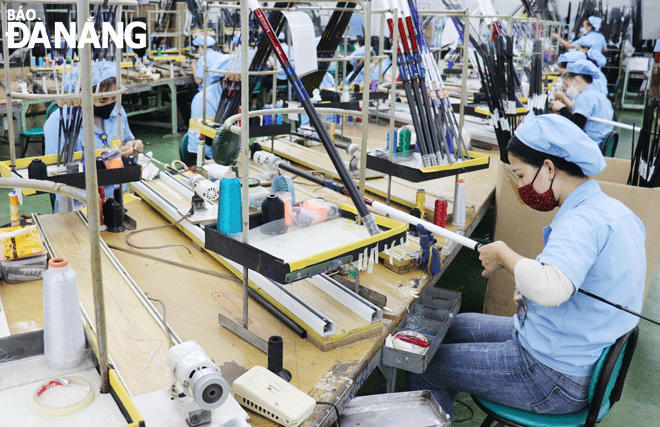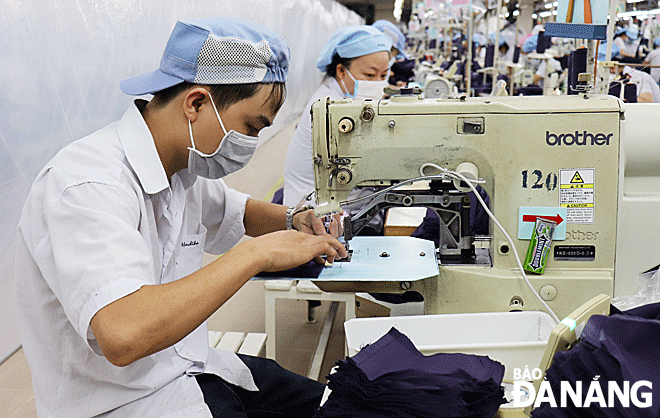Da Nang strives to reach economic targets set out for 2022
Given the unexpected complicated developments of COVID-19, Da Nang has failed to reach some economic targets set for 2021. The city has, therefore, set specific goals and orientations to well perform key tasks set for 2022.
 |
| Supporting businesses to overcome difficulties caused by the COVID-19 impacts is one of the solutions to economic recovery and development. Workers are seen at the Daiwa Viet Nam Co., Ltd. locate in Hoa Khanh Industrial Park, Lien Chieu District. Photo: K. HOA |
Next year will see the city continue to perform the dual tasks of fighting against COVID-19 in tandem with ensuring social welfare and promoting economic recovery and growth under the landmark theme ‘2022: the year of safe adaptation, flexibility, effective control of COVID-19 and socio-economic recovery and development’.
Specifically, the city sets such notable economic targets as a GRDP (gross regional domestic product) increase of 6 - 7% as compared to 2021.
The VAT (value added tax) in the service sector climbing up by 5-6% whilst the industry - construction up 6 - 7% and the agricultural sector up 2 - 3%.
The total export turnover of goods is estimated to increase by 9 - 10% and the total state budget revenue is likely to be equal to 92.1% of the figure recorded in 2021.
The Da Nang People's Committee has proposed three scenarios for economic development in 2022 with high, medium, and low growth rates in GRDP, respectively.
In an attempt to perform the tasks as above mentioned, relevant local agencies have mapped put specific solutions.
According to Mr. Nguyen Van Phung, Director of the Da Nang Department of Finance, under financial orientations for next year, and the 2021 - 2025 period as a whole, heed will be paid to effectively implementing guidelines and measures adopted by the national government on restructuring the State budget and tightening public debt management in order to ensure safe and sustainable national finance in association with economic restructuring, growth model innovation, thrift practice and waste prevention.
In order to achieve the planned budget collection, the implementation of policies and solutions to support the economy is very important, specifically exemption, reduction and extension of taxes, fees and charges for industries and fields, along with subjects seriously affected by the COVID-19 waves, the acceleration of the disbursement of public investment capital and the removal of difficulties for production and business activities.
 |
| Production activities at the 29-3 Textile and Garment Joint Stock Company. Photo: K. HOA |
Mr. Pham Truong Son, the Head of the Authority of the Da Nang Hi-tech Park and Industrial Zones (DHPIZA), said that his agency and other relevant local agencies will propose the municipal administration to effectively implement support policies targeting enterprises and promoting investment attraction for local industrial zones.
Also, focus will be on completing preparations for luring more investment channelled into new industrial parks and industrial clusters according to the approved planning, step by step perfecting the operation of the Da Nang Hi-tech Park, promoting incubation and training activities for high-tech enterprises and perfecting the infrastructure to attract science - technology and large-scale enterprises.
In the service sector, the city will implement a plan to restore Da Nang's tourism activities under the motto ‘Proactive - adaptive – flexible move’ to effectively restore tourism and ensure safety for tourists, tourism employees and the community as a whole.
In 2022, the city eyes to attract 3.5 million visitors, 3 times higher than 2021, including 180,000 international ones, up1.6 times, and 3.32 million domestic ones, up 3 times.
Meanwhile, a total of revenue generated from accommodation and travel services are estimated at VND6,700 billion, up 2.6 times as compared to 2021.
As export is the bright spot of its economic performance despite the negative impacts of COVID-19, the municipal administration will support businesses to restore production and step up exports, and improve their competitiveness as well.
In addition, more effective measures will be taken to ensure the circulation of goods in service for consumption and production needs, avoid any broken production and supply chains goods, restore passenger transport services and make proposals to reopen international transport routes.
Reporting by MAI QUE – Translating by A. THU